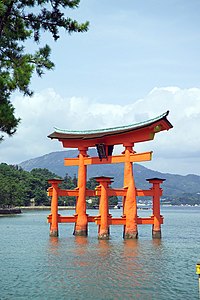What does Torii mean?
Definitions for Torii
ˈtɔr iˌi, ˈtoʊr-tori·i
This dictionary definitions page includes all the possible meanings, example usage and translations of the word Torii.
Did you actually mean torah or tore?
Wikipedia
Torii
A torii (Japanese: 鳥居, [to.ɾi.i]) is a traditional Japanese gate most commonly found at the entrance of or within a Shinto shrine, where it symbolically marks the transition from the mundane to the sacred. The presence of a torii at the entrance is usually the simplest way to identify Shinto shrines, and a small torii icon represents them on Japanese road maps. The first appearance of torii gates in Japan can be reliably pinpointed to at least the mid-Heian period; they are mentioned in a text written in 922. The oldest existing stone torii was built in the 12th century and belongs to a Hachiman shrine in Yamagata Prefecture. The oldest existing wooden torii is a ryōbu torii (see description below) at Kubō Hachiman Shrine in Yamanashi Prefecture built in 1535.Torii gates were traditionally made from wood or stone, but today they can be also made of reinforced concrete, copper, stainless steel or other materials. They are usually either unpainted or painted vermilion with a black upper lintel. Shrines of Inari, the kami of fertility and industry, typically have many torii because those who have been successful in business often donate torii in gratitude. Fushimi Inari-taisha in Kyoto has thousands of such torii, each bearing the donor's name.
Wikidata
Torii
A torii is a traditional Japanese gate most commonly found at the entrance of or within a Shinto shrine, where it symbolically marks the transition from the profane to the sacred. The presence of a torii at the entrance is usually the simplest way to identify Shinto shrines, and a small torii icon represents them on Japanese road maps. They are however a common sight at Japanese Buddhist temples too, where they stand at the entrance of the temple's own shrine, called chinjusha and usually very small. Their first appearance in Japan can be reliably pinpointed to at least the mid-Heian period because they are mentioned in a text written in 922. The oldest existing stone torii was built in the 12th century and belongs to a Hachiman Shrine in Yamagata prefecture. The oldest wooden torii is a ryōbu torii at Kubō Hachiman Shrine in Yamanashi prefecture built in 1535. Torii were traditionally made from wood or stone, but today they can be also made of reinforced concrete, copper, stainless steel or other materials. They are usually either unpainted or painted vermilion with a black upper lintel. Inari shrines typically have many torii because those who have been successful in business often donate in gratitude a torii to Inari, kami of fertility and industry. Fushimi Inari-taisha in Kyoto has thousands of such torii, each bearing the donor's name.
Suggested Resources
torii
The torii symbol -- In this Symbols.com article you will learn about the meaning of the torii symbol and its characteristic.
Surnames Frequency by Census Records
TORII
According to the U.S. Census Bureau, Torii is ranked #126765 in terms of the most common surnames in America.
The Torii surname appeared 135 times in the 2010 census and if you were to sample 100,000 people in the United States, approximately 0 would have the surname Torii.
82.9% or 112 total occurrences were Asian.
8.1% or 11 total occurrences were of two or more races.
7.4% or 10 total occurrences were White.
Numerology
Chaldean Numerology
The numerical value of Torii in Chaldean Numerology is: 6
Pythagorean Numerology
The numerical value of Torii in Pythagorean Numerology is: 8
Popularity rank by frequency of use
Translations for Torii
From our Multilingual Translation Dictionary
Get even more translations for Torii »
Translation
Find a translation for the Torii definition in other languages:
Select another language:
- - Select -
- 简体中文 (Chinese - Simplified)
- 繁體中文 (Chinese - Traditional)
- Español (Spanish)
- Esperanto (Esperanto)
- 日本語 (Japanese)
- Português (Portuguese)
- Deutsch (German)
- العربية (Arabic)
- Français (French)
- Русский (Russian)
- ಕನ್ನಡ (Kannada)
- 한국어 (Korean)
- עברית (Hebrew)
- Gaeilge (Irish)
- Українська (Ukrainian)
- اردو (Urdu)
- Magyar (Hungarian)
- मानक हिन्दी (Hindi)
- Indonesia (Indonesian)
- Italiano (Italian)
- தமிழ் (Tamil)
- Türkçe (Turkish)
- తెలుగు (Telugu)
- ภาษาไทย (Thai)
- Tiếng Việt (Vietnamese)
- Čeština (Czech)
- Polski (Polish)
- Bahasa Indonesia (Indonesian)
- Românește (Romanian)
- Nederlands (Dutch)
- Ελληνικά (Greek)
- Latinum (Latin)
- Svenska (Swedish)
- Dansk (Danish)
- Suomi (Finnish)
- فارسی (Persian)
- ייִדיש (Yiddish)
- հայերեն (Armenian)
- Norsk (Norwegian)
- English (English)
Word of the Day
Would you like us to send you a FREE new word definition delivered to your inbox daily?
Citation
Use the citation below to add this definition to your bibliography:
Style:MLAChicagoAPA
"Torii." Definitions.net. STANDS4 LLC, 2025. Web. 31 Jan. 2025. <https://www.definitions.net/definition/Torii>.







Discuss these Torii definitions with the community:
Report Comment
We're doing our best to make sure our content is useful, accurate and safe.
If by any chance you spot an inappropriate comment while navigating through our website please use this form to let us know, and we'll take care of it shortly.
Attachment
You need to be logged in to favorite.
Log In